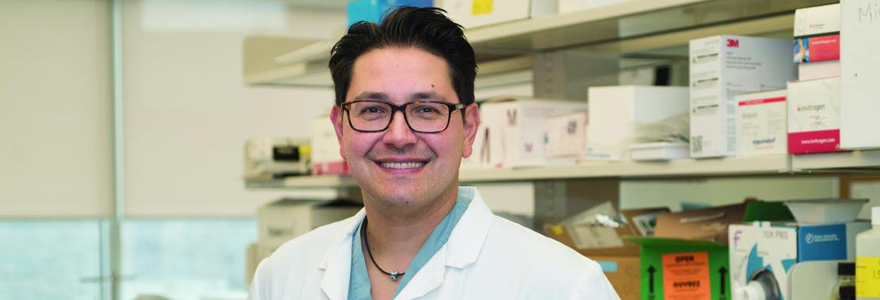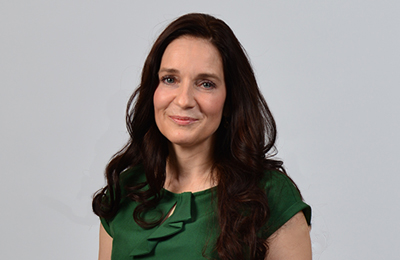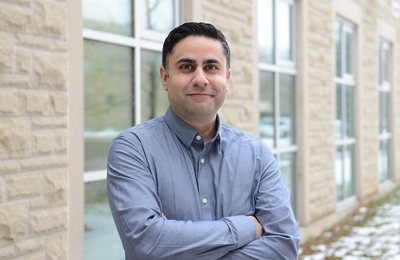From ideas to action: Supporting clinician researchers

Photo courtesy of Lawson Health Research Institute
By Emily Leighton, MA'13
From kidney transplantation to stigma reduction, the Academic Medical Organization of Southwestern Ontario (AMOSO) recognizes the value of physician involvement in research. The organization supports a start-up funding program called the Opportunities Fund to facilitate research success.
“Research is like going on an exploration, often we only have a slight hint of what we’re going to find. It’s the thrill of discovering the unknown that keeps many of us going.”
Transplant surgeon Dr. Alp Sener, an associate professor in Surgery and Microbiology & Immunology at Schulich Medicine & Dentistry, says research is one of the most exciting parts of his job.
In order to manage a successful research program, Dr. Sener maintains a demanding schedule. His unpredictable routine includes seeing about 60 patients in clinic each week, performing urological surgeries during the day and transplant surgeries at night, meeting with potential donors and transplant recipients, fulfilling academic leadership duties, and supervising graduate trainees – this in addition to the research projects he manages.
“It’s not a routine everyone wants, but the potential for innovation makes it all worthwhile,” he said.
Recognizing the importance of physician involvement in research, the Academic Medical Organization of Southwestern Ontario (AMOSO) aims to support physicians in pursuing their research interests.
Established in 2003, AMOSO is the local governing body responsible for the implementation and management of the London Ontario Academic Health Sciences Centre’s Alternative Funding Plan Agreement (AFP). Its mission is to promote the recruitment, retention and academic excellence of clinical academic physicians in the region.
In order to do this, the organization supports two research-funding competitions, the AMOSO Opportunities Fund and the AHSC AFP Innovation Fund. The Opportunities Fund provides one-time start-up funding to compensate physicians taking on new academic roles or newly recruited physicians.
“The Opportunities Fund is a great way to reinvent an academic career,” explained Dr. Janet Pope, chair/chief of Rheumatology and chair of the Fund’s sub-committee. “Protecting time to ‘think outside the box’ helps facilitate research success, and leads to collaborations across the School.”
The Fund has awarded more than $13 million to date, supporting more than 100 research projects. Many project leaders have also gone on to generate additional funding to continue their work.
Tipping the balance on kidney transplantation
“This type of research funding is so important as it allows physicians an opportunity to gain valuable support and peer review, and to be successful in securing funding for these types of high-yield projects,” said Dr. Sener. “This speaks to the importance our institutions place on research and innovation.”
Dr. Sener received support through the Opportunities Fund in 2018 for his research on the modification of standard organ preservation techniques.
With the goal of improving short- and long-term transplant organ function and patient survival, he examined how hydrogen sulphide – a poisonous gas that is endogenously made in each of us in small quantities – could play a role in the preservation process.
He found that adding hydrogen sulphide donor molecules to organ preservation solutions in cell and animal models leads to significant reductions in cellular injury and improves transplant graft function. The funding obtained from AMOSO will enable his team to expand the research to discarded human grafts that are unusable for clinical transplantation. It will also enable them to carry out pilot clinical trial, which will be the world’s first human transplant using a novel hydrogen sulphide-based organ preservation solution.
“This is a novel, but inexpensive way to improve kidney transplant graft function and longevity,” Dr. Sener explained. “If we can ensure that existing grafts not only last longer and perform better, we can start to tip the balance so that patients being transplanted recover faster and less of them are listed for transplant. This would be a win-win for the health care system and for patient satisfaction and experience.”
Understanding cognitive deficits and psychiatric symptoms in Parkinson’s disease

Dr. Penny MacDonald, associate professor in Neurology, studies different facets of cognition in patients with prominent striatal dysfunction, present in Parkinson’s disease, obsessive-compulsive disorder and addiction.
“The overarching goal of this research is to improve diagnosis and suggest more effective treatments based on the insights we gain,” she explained.
With support from the Opportunities Fund in 2012, Dr. MacDonald set out to increase understanding of the cognitive deficits and psychiatric symptoms experienced by patients living with Parkinson’s disease. Her work also looked at how these symptoms evolve with disease progression and respond to dopaminergic medication (drugs which target the neurotransmitter, dopamine).
Dr. MacDonald credits the Opportunities Fund in her appointment as Canada Research Chair in Cognition and Neuroimaging, as well as a number of larger grants she has received to support her work.
“Physicians strive to conduct research that has impact, train students who will go forward and expand their research questions, and also provide the highest quality care to their patients. This balancing act is difficult to achieve successfully,” she said. “A research program that aims to support clinician-scientists at the beginning of their careers can be a determining factor in how they contribute in meaningful ways to their academic fields.”
Reducing stigma and bias in health care environments
 Dr. Javeed Sukhera, assistant professor in Psychiatry and Paediatrics, is interested in stigma reduction and bias in health care settings. He received support through the Opportunities Fund in 2014 to explore reducing stigma through implicit bias education.
Dr. Javeed Sukhera, assistant professor in Psychiatry and Paediatrics, is interested in stigma reduction and bias in health care settings. He received support through the Opportunities Fund in 2014 to explore reducing stigma through implicit bias education.
Funded for two years, the project looked at how stigma influences health care for patients in acute care environments. Dr. Sukhera used this information to design and evaluate a stigma-reduction training curriculum for health professionals.
He says the Opportunities Fund was essential in helping establish his research program. “Start-up grants serve as catalysts for clinical faculty who have research ideas, but need time, support and mentorship which help them grow their ideas into scalable projects while developing their research skills in the process.”
From youth mental health to neonatology: Newly funded projects announced
The Opportunities Fund competition is held twice annually, in April and September. Recipients of the 2018 Fall Competition were recently announced.
Dr. Ian Ball, Medicine
Surveillance, prevention and treatment of intra-abdominal hypertension and abdominal compartment syndrome: A single center prospective cohort study
Dr. Kristin Clemens, Medicine
Denosumab (Prolia) in patients with chronic kidney disease: is there a role?
Dr. Marat Slessarev, Medicine
Documenting neurologic function during the dying process to optimize organ donation in Canada
Dr. Soume Bhattacharya, Neonatology
Early Cardiac Function, cerebral blood flow and cerebral metabolism in premature neonates: Exploring the evolution of pre-term brain injury
Dr. Arlene MacDougall, Psychiatry
Igniting the MINDS of London Middlesex: Using social innovation and collective impact to address transitional age youth mental health and addiction problems
Dr. Kelly Vogt, Surgery
Patient important outcomes in emergency general surgery: What are they and how does the Acute Care Surgery model measure up?
Contact AMOSO by email at amoso@lhsc.on.ca


